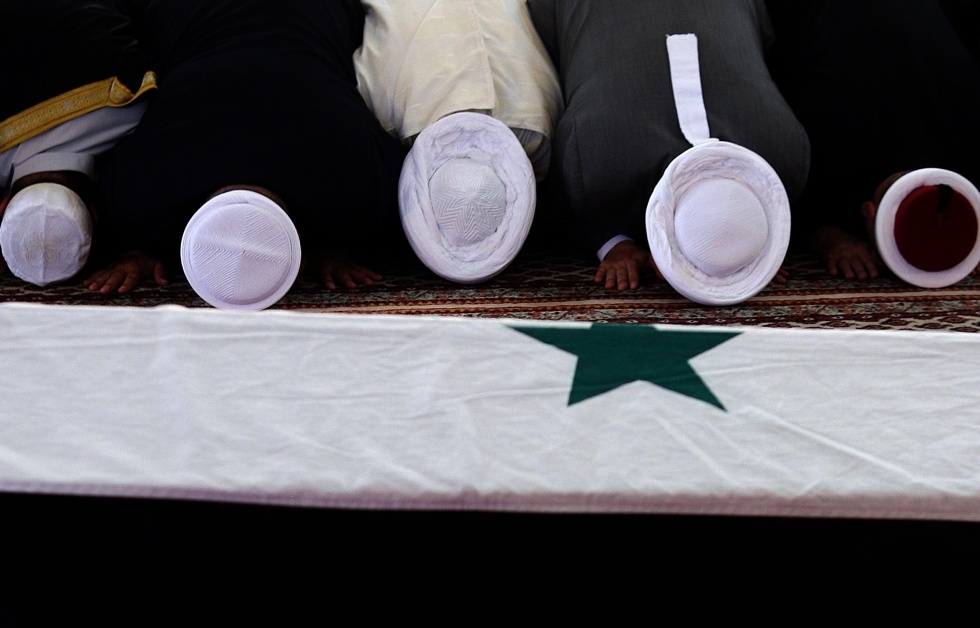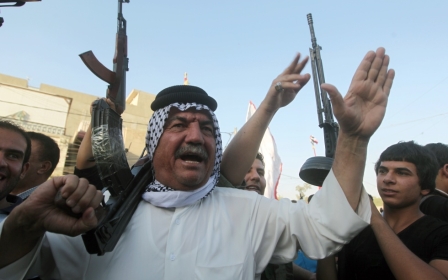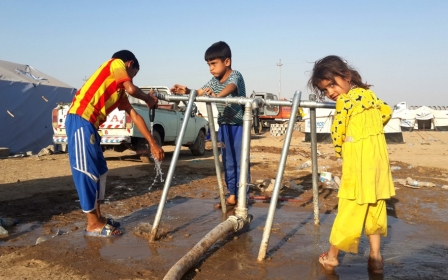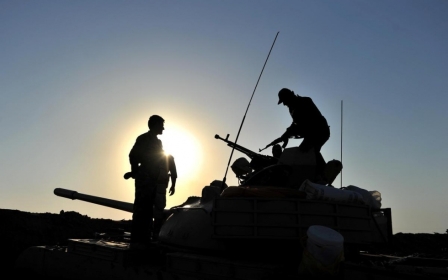Syrian Sunni clerics slam 'infiltrated' Islamic militants

A group of Syrian Sunni clerics has called on the country's Muslims to fight against the militant group Islamic State of Iraq and the Levant (ISIL), which runs a Sunni militant insurgency against the Shiite government in Iraq.
"ISIL has no relevance to Sunnism, but is affiliated with intelligence organizations that breach human rights, and try to undermine jihad and revolution," the Islamic Assembly of Syria said in a statement Wednesday.
"Intelligence agents have tried to infiltrate the opposition in order to deviate the course of the Syrian revolution. But when they could not achieve this goal, they broke away to form ISIL, and began to attack the Syrian revolutionists.
"Therefore, it is obligatory upon all Muslims to fight the ISIL," it said.
The Assembly is headed by Syrian Muslim scholar Usame Rifai and comprises 128 delegates and 21 representatives.
According to The Syrian Centre for Political and Strategic Studies, Sheikh Rifai has been an advocate of the protests against the Syrian government from the onset in March 2011 and underwent hospitalisation after being attacked by forces loyal to Bashar al -Assad during a demonstration in a mosque in Damascus.
ISIL, which already controls parts of Syria, has extended its reach into Iraq since 10 June, when it seized Iraq's second-largest city Mosul and soon afterwards took near-complete control of the northern city of Tikrit.
Iraq has seen a marked increase in sectarian violence between Sunni and Shi'a Muslims in recent months, which the Iraqi government blames on ISIL.
An appeal for common sense in Muslim world
Meanwhile, Turkey's President of Religious Affairs, Mehmet Gormez, calls on the Sunni and Shia scholars across the world to take an initiative that aims to eliminate polarisation based on sectarianism.
Attempts to base conflicts in the Middle East on Islamic sects have reached serious dimensions that are threatening not only Iraq and Syria, but the whole Islamic world, Turkey's President of Religious Affairs Mehmet Gormez said in a message addressed to the Muslim world on Wednesday.
"The chaotic environment that is being experienced in the Iraqi and Syrian axis has fuelled tensions to new heights with new events led by the situation in Mosul," Gormez said.
He warned that reciprocal statements that contain violence, declarations of jihad, threats aimed at the destruction of holy shrines, kidnappings and killings should be regarded as the pre-shocks of the approaching mass disasters.
"It is inevitable that the Islamic world will suffer permanent humane, social, religious and sectarian divisions if these events continue to escalate unabated."
Killing people against Quran
Stressing that the Muslim identity is above all sectarian, dispositional and political considerations, Gormez has said that no structure should be allowed to spoil Islamic fraternity and unity.
"According to the Quran and the Sunnah (teachings and actions of the Prophet), the lives, the blood, the wealth and the honor of people are untouchable. Shedding the blood of a person unjustly is regarded as the greatest crime according to religion," he said.
Alienation of other religions unacceptable
There is no way to run a community on a structure based on religious, sectarian and ethnic principles especially as this community has existed for 1,400 years with all its differences, Gormez said.
"No one or no group can declare war against the beliefs, values and thoughts of others. Everyone should have the right to live freely on the lands they live in accordance with their historical accumulation."
"No Muslim group, faction or community can accept its own religious understanding as the truth and alienate other religious approaches and declare them unbelievers and condemn them to death. This is unacceptable."
Gormez has also emphasised that a structure that is being constructed on driving defenceless people, children and women from their homes and destroying them as the victims of a clash of interests cannot identify itself with Islam.
Fatwas of jihad a source of deep concern
Gormez has said a declaration of jihad of some sides against the other cannot be accepted.
"Because the Quran and the teachings and actions of the Prophet has never commanded a jihad that allows the shedding of the life and blood of a Muslim by another Muslim."
"The greatest jihad that the Muslims can declare today is the all-out jihad against ignorance, poverty, oppression, sedition and discord. No one can justify the creation of new wrong doings in the name of a jihad against oppression," he said.
A call on Muslim scholars to put out the fire of sedition
Gormez said that it falls upon such scholars to strive to reconstruct the morals and rules of living together in peace by keeping in mind the religious, language, disposition and ideological differences that exist in the Islamic world instead of issuing fatwas that only serve to create divisions in the society.
"Today fatwas that lead to bloodshed have no value just as words that fail to extinguish the fire of sedition have no meaning. Failure to do this will push the Islamic world into an environment of crime and will turn the scholars into criminal accomplices."
Calling on the representatives of religious institutions and establishments to come up with initiatives to eliminate the polarisation based on sectarianism in the regions of hot conflict, particularly Iraq and Syria, Gormez has said that The Presidency of Turkish Religious Affairs would be happy to lead such an effort of bringing together the Sunni and Shiite scholars throughout the world.
Gormez's message, titled "An Appeal to the Islamic World for Common Sense" and televised in Arabic language, has been translated into Turkish, Persian, English, French, German, Russian and Kurdish languages.
New MEE newsletter: Jerusalem Dispatch
Sign up to get the latest insights and analysis on Israel-Palestine, alongside Turkey Unpacked and other MEE newsletters
Middle East Eye delivers independent and unrivalled coverage and analysis of the Middle East, North Africa and beyond. To learn more about republishing this content and the associated fees, please fill out this form. More about MEE can be found here.




